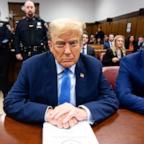Nuclear Confrontation: Does the US Have Any Good Options On Iran?
Feb. 2, 2006 — -- The latest row between the United States and Iran has reached a decisive phase with neither side prepared to back down on Iran's nuclear ambitions.
Analysts believe that both the true intentions of Iran and the options available to the United States remain extremely murky. In addition, reporting Iran to the U.N. Security Council could encourage the country -- used to tensions with the West -- to advance its nuclear program, not quell its ambitions.
Iran denies any intention of developing nuclear weapons, but the West doesn't trust the Islamic republic. Right now the Vienna, Austria-based International Atomic Energy Agency is meeting to consider a resolution on whether to refer Iran to the Security Council. The 35-member IAEA board is expected to ask the Security Council to take on oversight of Iran's nuclear program.
Iran refuses to back down and has said that if it is reported, it will resume uranium enrichment and end U.N. checks.
Iran's referral to the Security Council is only the first step to possible sanctions against its capital, Tehran. But such an action is expected to face delays. Iran's ambassador to the IAEA, Ali Soltanieh, told the BBC he was sure that Russia and China would side with Iran.
"They are not going to support [the draft resolution] because they know how essential the bilateral relations that we have with China and Russia are," Soltanieh said.
The war of words between Europe and the United States, and Iran began after Tehran's decision to restart small-scale uranium enrichment after a two-year freeze.
Iran removed U.N. seals at the Natanz facility on Jan. 9, prompting the international community to call for the involvement of the Security Council for the first time.
Months of negotiations between certain members of the European Union, comprising Britain, France and Germany, led to an impasse.
The Bush administration had viewed the diplomatic route as the way to proceed until Mahmoud Ahmadinejad won the election. Ahmadinejad, Iran's new president, insisted on pursuing nuclear ambitions again.
Under Ahmadinejad, Iran has riled the West, but it still remains to be seen who is calling the shots: the country's hard-line clerics or the president.
In a speech on state television Wednesday, Ahmadinejad said Iran would never give up its "right" to peaceful nuclear energy. This was hours after President Bush sent out a clear warning in his State of the Union address, saying Iran should not be permitted to obtain nuclear weapons.




